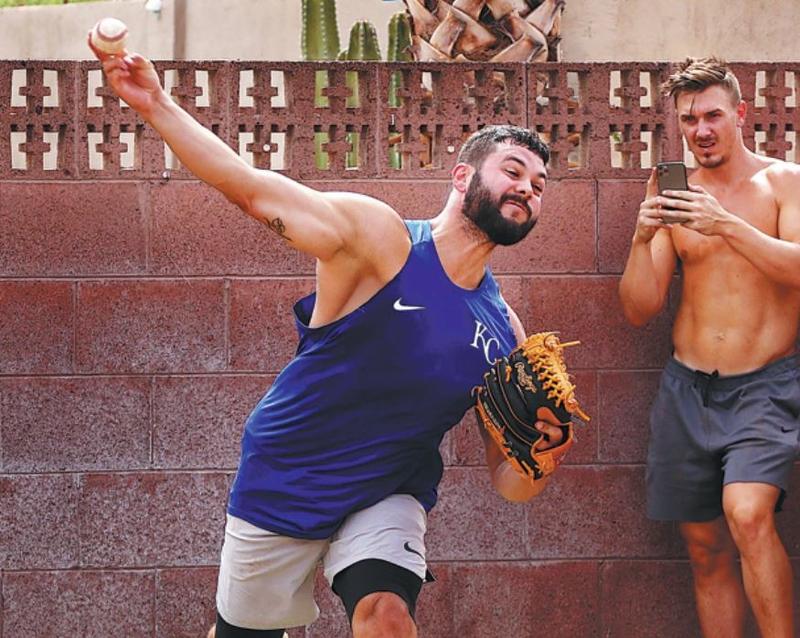 Kansas City Royals' Jakob Junis throws a pitch as Seth Blair of the San Diego Padres catches the moment on camera during a training session in Blair's backyard last Friday in Scottsdale, Arizona. A number of MLB players have been training at Blair's house since the season was paused indefinitely amid the COVID-19 pandemic. (PHOTO / AFP)
Kansas City Royals' Jakob Junis throws a pitch as Seth Blair of the San Diego Padres catches the moment on camera during a training session in Blair's backyard last Friday in Scottsdale, Arizona. A number of MLB players have been training at Blair's house since the season was paused indefinitely amid the COVID-19 pandemic. (PHOTO / AFP)
Whether or not Major League Baseball plays a coronavirus-delayed 2020 season will likely come down to how the owners and players resolve their differences on how many games will constitute the regular season.
MLB does not want to play past October because it fears a second wave of the coronavirus could disrupt the postseason and jeopardize US$787 million in broadcast revenue
Two weeks ago MLB owners rejected the players' proposal for a 114-game regular season with no additional salary cuts, saying an 82-game schedule starting in early July was the most viable option.
That was revised last week when MLB commissioner Rob Manfred outlined a regular season that opens in late July, plays 50 or 60 games and concludes with expanded playoffs in October.
Unable to reach a compromise with the players' union on salaries across a longer season, Manfred is looking to enforce the terms of a March 26 agreement that granted him powers to determine when it was safe to start play.
Under that plan, players would receive prorated salaries, a point of emphasis for the union during negotiations, along with providing owners with economic relief through a season significantly shorter than what was previously proposed by both sides.
ALSO READ: Salary strife clouds restart proposals
"We do not have any reason to believe that a negotiated solution for an 82-game season is possible," deputy commissioner Dan Halem wrote in a letter to chief union negotiator Bruce Meyer that was obtained by Associated Press.
The 82-game plan included a sliding scale of pay decreases that would leave players at the US$563,500 minimum with 47 percent of their original salaries and top stars Mike Trout and Gerrit Cole at less than 22 percent of the US$36 million they were each set to earn.
Players insisted they receive the prorated salaries agreed to in the March 26 deal, which would give them 70 percent pay at 114 games.
That agreement called for the sides to "discuss in good faith the economic feasibility of playing games in the absence of spectators".
There has not been a schedule averaging fewer than 82 games per team since 1879.
Empty ballparks look to be a certainty due to the pandemic, and team owners are looking for additional salary reductions. The 60-game schedule proposed by Manfred would result in players receiving about 30 percent of their full salaries under the March 26 deal.
MLB does not want to play past October because it fears a second wave of the coronavirus could disrupt the postseason and jeopardize US$787 million in broadcast revenue.
Halem cited MLB's infectious disease consultant, Dr Ali Khan, Dean of the College of Public Health at the University of Nebraska.
"It is not in the collective interest of clubs or players to begin a 2020 season and subsequently be forced to suspend or cancel it before the completion of the postseason," Halem wrote.
READ MORE: Opening of MLB regular season to be pushed back to mid-May
"Dr Khan and his team have advised us that to minimize the risk of a subsequent delay or cancellation of the 2020 season we should endeavor to complete the season and postseason as early in the fall as possible.
"In addition, your proposal ignores the realities of the weather in many parts of the country during the second half of October. If we schedule a full slate of games in late October, we will be plagued by cancellations."
As part of the March 26 deal, players got US$170 million in salary advances-ranging from US$16,500 to US$286,500-and a guarantee that if the season is scrapped each player would get 2020 service time matching what the player accrued in 2019.


